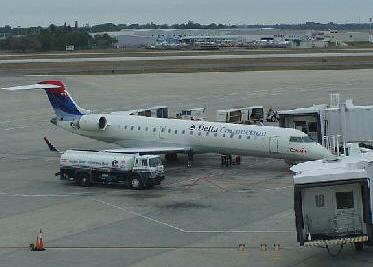|
|||||||||||
|
|
|
|||
|
Airlines
And Regional Air Carriers To Be Audited By OIG For Safety |
||||
 |
August 20, 2010 - The Office of Inspector General (OIG) plans to audit domestic code share agreements between mainline and regional air carriers.
These agreements
allow mainline and regional carriers to coordinate their flight
schedules so that the regional carriers marketed under the name of the
mainline carrier can provide passengers with connections from cities
that cannot support major airline jet service to larger hub cities
served by major air carriers. As code share agreements become a more integral part of the aviation system, the Federal Aviation Administration (FAA) and the Department of Transportation (DOT) have made it a top priority to ensure the safety of passengers who depend on those flights. |
|||
|
|
||||
|
OIG will be
conducting this audit at the request of the Chairmen of the House
Committee on Transportation and Infrastructure and the Subcommittee on
Aviation. The audit objectives
will be (1) examine DOT and FAA legal authority to review agreements
between mainline air carriers and their regional partners, (2) assess
policies and procedures between mainline air carriers and their regional
partners to ensure one level of safety, and (3) determine whether
passengers have adequate information to make informed decisions when
purchasing an airline ticket. February 2009, Colgan Air Flight 3407 was operating as a Continental flight under a code share agreement crashed killing all 49 onboard a Bombardier Dash 8-Q400. The NTSB ruled that the pilots lacked the required skills and Colgan Air failed to provide adequate training. There have been several accidents in the past in which the NTSB investigators reported pilot error due lack of training provided by the regional carriers and the pilots lacked sufficient flight time. (See NTSB Symposium Airline Code Sharing It?s Role On Aviation Safety). On August 1st Congress passed the Airline Safety And Pilot Training Improvement Act in order to improved pilot training and screening. |
||||
|
There are more than 13,000 regional airline flights every day and approximately 160 million passengers travelling on regional aircraft each year. Regional air carriers use smaller aircraft to connect cities that cannot support major airline jet service to larger hub cities served by major air carriers. To do so, the mainline and regional carrier create a joint marketing agreement, known as code sharing, which allows them to coordinate flight schedules in order to interchange passengers.
Under these
agreements, the mainline carrier allows the regional airline to (1) use
the mainline carrier?s reservation system and flight designator code to
identify flights and fares in computer reservation systems; (2) utilize
the mainline carrier?s paint scheme, logos, service marks, and uniforms
and (3) participate in joint promotion and advertising. As a result,
passengers receive lower fares and more seamless travel, regional
carriers benefit from the recognition connected to the mainline carrier
selling the tickets, and mainline carriers gain access to additional and
smaller aircraft with no ownership stake for bringing passengers to
their hub.
Given these
benefits, airlines are increasingly using code share agreements. As
these agreements become a more integral part of the aviation system, the
Federal Aviation Administration (FAA) and the Department of
Transportation (DOT) have made it a top priority to ensure the safety of
passengers who depend on those flights. This is particularly critical
given that seven of the last nine domestic, commercial airline crashes
have involved regional air carriers flying under code share agreements. On February 3, 2010, James L. Oberstar, Chairman of the House Committee on Transportation and Infrastructure, and Jerry F. Costello, Chairman of the Subcommittee on Aviation, requested that we review domestic code share relationships. OIG will begin the audit later this month and the audit will include visits to FAA Headquarters and regional offices as well as Flight Standards Service field offices. |
|
|
| Other News Stories |
| ?AvStop
Online Magazine
Contact
Us
Return To News
|
|


